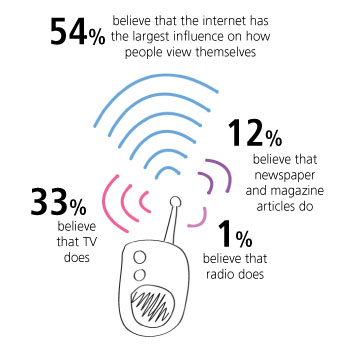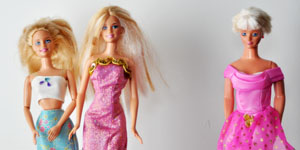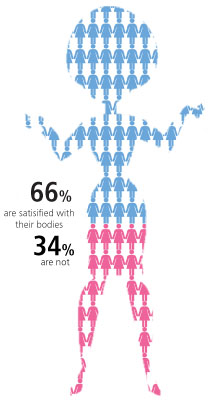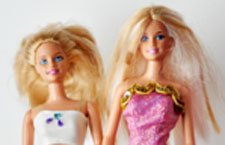Bruno Mars thinks you’re amazing the way you are. Selena Gomez says you’re beautiful. But Kim Kardashian has more curves. And Justin Bieber has better hair.
With shows like Gossip Girl and The Biggest Loser, our perception of the “average American” is all skewed. Is he or she the skin-and-bones America’s Next Top Model contestant or the 300-pound, morbidly obese person on One Big Happy Family?
The contradictory messages from the media was also highlighted in the last issue of the Verdedera. While the media promotes remaining true to yourself, it also projects underlying ideas about changing your body to look perfect.
“[The conflict is] like a devil and [an] angel,” senior Kathleen Chang said. “You can’t really decide which one you’re supposed to follow.”

Mitigating the conflict
Despite Chang’s ambivalence, there is a way to overcome outside pressures and be satisfied with who we are. Student advocate Richard Prinz believes the solution comes from awareness. We should step back and evaluate the effects of the media.
Freshman Yu Hong Hwang understands Prinz. He realized the media was only attempting to get him to follow a generic mold of how a person should be.
“If people aren’t like this, then they say ‘You should buy this, buy that’ and [they are] basically getting us to give them our money,” Hwang said.
The next step is to make a conscious decision about how we’re impacted. “[We have to] realize we have a choice,” Prinz said. “I think if people get educated about [body image] and start broadening their horizons and get the confines of our culture, then we can feel good about ourselves.”
Senior Michael Goldman has made that decision.
“I decided a long time ago just to block out what the media says because pretty much anything you find [is] just going to be a conflicting message,” he said.
As for Hwang, nobody has ever given him a good reason to pay attention to how his body looks. “Reasons I have heard are shallow and sometimes they’re just weird or silly,” he said. As a result, Hwang has chosen not to care.

It’s also important to realize that what we see isn’t really what we get. Appearances can be deceiving when Photoshop dictates our world. Chang has already discovered that. When she looks at models in Japanese fashion magazines and online shopping catalogs, she tells herself the models have been digitally enhanced.
“[It] makes me feel better that [the models are] not perfect people, they’re not mannequins,” she said.
But even she is not completely unaffected by the media. There were times when she wanted to be like those models on the page. “You dream a bit, but you know that you sometimes might never get [that body],” Chang said.
The quickest way to relieve pressure from the conflict between being yourself and looking like a model is through accepting your flaws. That’s how Goldman deals with himself. To him, there’s nothing better than comedy.
“One thing that’s very useful is being able to make fun of yourself,” he said.

Perhaps his humorous nature has been influenced by Lewis Black, Louis C.K., and Jon Stewart, his favorite comedians. By making jokes, Goldman was able to come to terms with his imperfections.
“It makes you feel a lot better,” he said.
Chang came to terms with her body rather suddenly, when she found the courage to dress up for FanimeCon as a cosplayer last year.
“Everyone there was really okay with [how I dressed up],” she said, and was thrilled that complete strangers had accepted how she looked. The experience liberated her by giving a her a day when she didn’t really have to care about how she looked.
A change for better or worse
But sometimes, the message of “being yourself” is taken too far.
“We also have that part of our society that’s trying to counter this ‘thin’ [obsession],” Prinz said. “So people are trying to counter that by saying, ‘It’s okay to be overweight.’”
He warns that it sometimes may get to the point where one accepts an unhealthy body, even if changing is the better choice.
Instead, less-than-fit people can find reason in Goldman’s belief. Even though he doesn’t really care about his body image, he acknowledges that he is slightly overweight. Because of that, his need to change his body is more for health reasons than body-conscious reasons.
Taking matters into his own hands, he has decided to exercise with his friends. Everyone in that group acts as a positive influence on each other; without them, Goldman would not have as much self-determination to continue working out.
Prinz notes that someone who is overweight shouldn’t beat themselves up because of it. It’s important not to create additional problems by putting yourself down or becoming hopeless. Once there’s awareness, more steps can be taken to ensure satisfaction with body image.
“Think of [changing your body] more as a community, not a self-centered, self-cherishing kind of act,” Prinz said. “[Think of it as:] I need to do this to help out those around me because it’s going to be more costly, I’m going to be in the hospital more, my loved ones are going to be more concerned, so I need to take care of myself.”

Over my ______ body by Cynthia Mao and Daniel Tan is licensed under a Creative Commons Attribution-NonCommercial-ShareAlike 3.0 Unported License.





